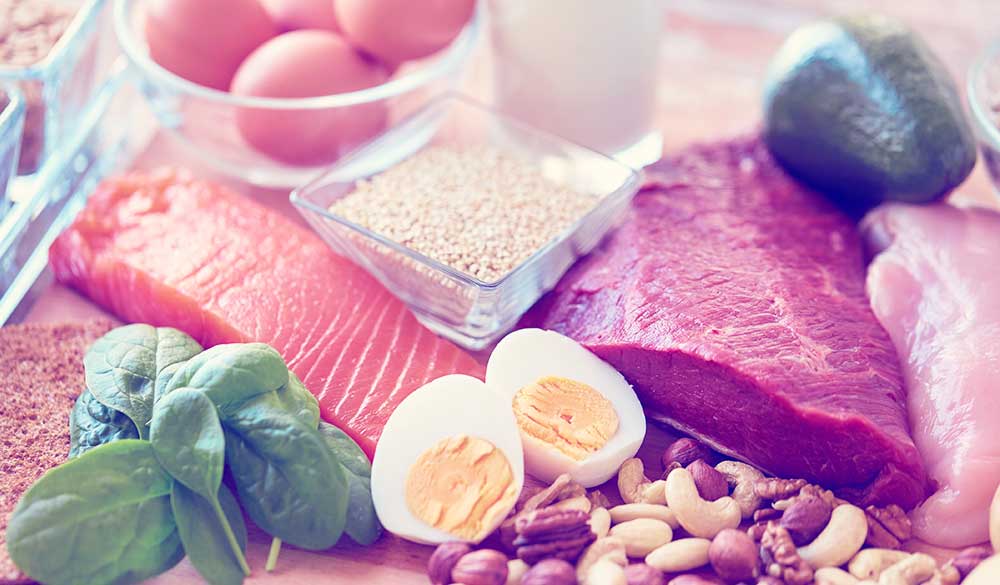Protein is a well-known appetite suppressant – it works in a number of ways. For example, a high protein intake boosts metabolism by preserving lean muscle mass, balances blood-glucose levels, reduces appetite and affects several weight-regulating hormones. Fat-loss associated with a high protein diet includes subcutaneous and also metabolically-active visceral fat.
Protein is an important factor in a weight-loss diet. Protein’s powerful hunger-reducing effects may be the most important factor in weight-loss. It also regulates the function of weight-regulating hormones.[1,2]
The hypothalamus regulates and processes a number of different types of information including appetite-regulating chemicals. For example, higher levels of protein increase the satiety hormones glucagon-like peptide 1 (GLP-1), peptide YY and cholecystokinin while reducing levels of the hunger-hormone ghrelin.[3-6]
Digesting and metabolising protein also burns calories which is called the thermic effect of food (TEF). Protein has a TEF of 20-30%, compared to carbohydrates (5-10%) and fat (0-3%).[7] Thus, if protein has a TEF of 30%, out of 100 calories only 70 are used while 30 are burnt off as heat.
Consuming 30% of calories from protein may also mean that fewer calories are consumed. In a study published in the American Journal of Clinical Nutrition, participants consumed an average of 441 fewer calories per day when their diet was comprised of 30% protein compared with when they followed a diet comprising 10% protein. Other research has shown that a protein-rich diet boosts metabolism and increases the number of calories burned by about 80 to 100 per day.[9-11]
On a weight-reducing diet, it is essential to consume sufficient protein to help reduce fat mass, retain muscle mass and maintain a healthy metabolism. On a high-protein diet, more calories are burned throughout the day and also during sleep.[12]
Muscle-loss can be an unwanted side effect of weight-loss since this can reduce metabolic rate. A high-protein diet can help to minimise muscle-loss and maintain a higher metabolic rate while losing body fat – both subcutaneous and visceral. Consumption of protein can reduce muscle loss, thus helping to retain a higher metabolic rate as you lose body fat.[13-16]
Resistance or strength training has also been shown to reduce muscle-loss and metabolic slowdown during a weight-loss program.[16] Any weight-reducing diet must be used in conjunction with restricted calorie intake and regular exercise. Protein provides a similar number of calories to carbohydrates and overconsumption of calories from any source can negate the calorie deficit caused by the increased protein intake.[17]
Most studies that have examined the effect of protein in weight-loss have expressed intake as a total daily percentage; an intake of 30% intake of protein of calories seems to be effective for weight-loss. A total of 30% of calories amounts to 150 grams of protein on a 2000 calorie diet. However, a range of 25-35% seems to be useful, too.
Meat, dairy, eggs and animal protein alternatives such as legumes and lentils, seeds and nuts are good dietary sources of protein. A dietary protein supplement incorporating protein from whey, casein, egg, or soy is a helpful option if an individual is struggling to consume enough protein.
Brown rice protein powder is an alternative to traditional protein powders and is compatible with vegan, gluten-free and low-allergen diets. Brown rice protein powder is especially high in cysteine, a sulphur-containing amino acid needed for glutamine synthesis and methionine, which plays an important role in the synthesis of other proteins, such as carnitine which helps convert fats to energy. Retaining a similar amino acid profile to other protein sources, rice protein has been demonstrated to be comparable to whey at building muscle, strength and aiding in exercise recovery.
References
- Leidy HJ, Clifton PM, Astrup A et al. The role of protein in weight loss and maintenance. Am J Clin Nutr. 2015 Apr 29 [Abstract]
- Astrup A, Raben A, Geiker N. The role of higher protein diets in weight control and obesity-related comorbidities. Int J Obes (Lond). 2015 May; 39(5): 721–726 [Full Text]
- Lejeune MP, Westerterp KR, Adam TC, et al. Ghrelin and glucagon-like peptide 1 concentrations, 24-h satiety, and energy and substrate metabolism during a high-protein diet and measured in a respiration chamber. Am J Clin Nutr. 2006 Jan;83(1):89-94 [Abstract]
- Batterham R, Heffron H, Kapoor S, et al. Critical role for peptide YY in protein-mediated satiation and body-weight regulation. Cell Metab. 2006 Sep 4(3):223-233 [Full Text]
- Lomenick J, Melguizo M, Mitchell S, et al. Effects of Meals High in Carbohydrate, Protein, and Fat on Ghrelin and Peptide YY Secretion in Prepubertal Children. J Clin Endocrinol Metab. 2009 Nov;94(11):4463-71 [Full Text]
- Blom WA, Lluch A, Stafleu A, et al. Effect of a high-protein breakfast on the postprandial ghrelin response. Am J Clin Nutr. 2006 Feb;83(2):211-20 [Abstract]
- Westerterp K. Diet induced thermogenesis. Nutr Metab (Lond). 2004;1:5 [Full Text]
- Weigle DS, Breen PA, Matthys CC, et al. A high-protein diet induces sustained reductions in appetite, ad libitum caloric intake, and body weight despite compensatory changes in diurnal plasma leptin and ghrelin concentrations. Am J Clin Nutr. 2005 Jul;82(1):41-8 [Abstract]
- Johnston CS, Day CS, Swan PD. Postprandial thermogenesis is increased 100% on a high-protein, low-fat diet versus a high-carbohydrate, low-fat diet in healthy, young women. J Am Coll Nutr. 2002 Feb;21(1):55-61 [Abstract]
- Veldhorst MA, Westerterp-Plantenga MS, Westerterp KR. Gluconeogenesis and energy expenditure after a high-protein, carbohydrate-free diet.Am J Clin Nutr. 2009 Sep;90(3):519-26 [Abstract]
- Veldhorst MA, Westerterp KR, van Vught AJ, et al. Presence or absence of carbohydrates and the proportion of fat in a high-protein diet affect appetite suppression but not energy expenditure in normal-weight human subjects fed in energy balance. Br J Nutr. 2010 Nov;104(9):1395-405 [Abstract]
- Bray G, Redman L, de Jonge L, et al. Effect of protein overfeeding on energy expenditure measured in a metabolic chamber. Am J Clin Nut. 2015 Mar 1;101(3):496-505 [Full Text]
- Mettler S, Mitchell N, Tipton KD. Increased protein intake reduces lean body mass loss during weight loss in athletes. Med Sci Sports Exerc. 2010 Feb;42(2):326-37 [Abstract]
- Kim JE, Sands L, Slebodnik M, et al. Effects of high-protein weight loss diets on fat-free mass changes in older adults: a systematic review FASEB J 2014 Apr 1;28(1)Supp 371.5 [Abstract]
- Layman DK, Evans E, Baum JI, et al. Dietary protein and exercise have additive effects on body composition during weight loss in adult women. J Nutr. 2005 Aug;135(8):1903-10. [Abstract]
- Layman DK, Boileau RA, Erickson DJ, et al. A reduced ratio of dietary carbohydrate to protein improves body composition and blood lipid profiles during weight loss in adult women. J Nutr. 2003 Feb;133(2):411-7. [Abstract]
- Weigle DS, Breen PA, Matthys CC, et al. A high-protein diet induces sustained reductions in appetite, ad libitum caloric intake, and body weight despite compensatory changes in diurnal plasma leptin and ghrelin concentrations. Am J Clin Nutr. 2005 Jul;82(1):41-8 [Abstract]
DISCLAIMER:
The information provided on FX Medicine is for educational and informational purposes only. The information provided on this site is not, nor is it intended to be, a substitute for professional advice or care. Please seek the advice of a qualified health care professional in the event something you have read here raises questions or concerns regarding your health.



